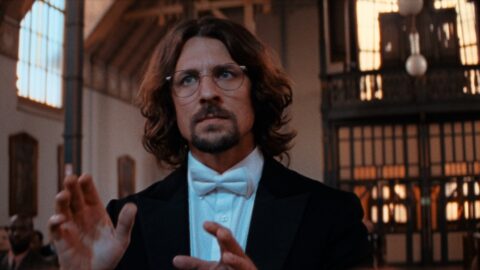Powerful people have that nasty skill in making vulnerable people feel like they are more unique than they really are. They know which buttons to push; how to make them feel special; make them crave their attention, before they finally reveal what they really want. Broken Voices (Ondřej Provazník, 2025) provides us with an insiduous masterclass in male manipulation, using the perspective of a child to devastating, even cruel effect.
It’s the 1990s. The Czech Republic might be free from communism, but it isn’t free from beige aesthetics, dark-wood panelling and multicoloured ski jackets. It’s a different world, but still not long enough in time to make the events of this film feel normal. Especially not as the small country looks to bolster its connection with the United States through a choir tour, visiting and building connections with the Czech community there.
One of the top contenders to make it on this all-girls choir — famed for its stark range of tones, piercing voices, flawless harmonies and haunting wall of sound — is the 15-year-old Lucie (Maya Kintera), whom we first view from afar amidst a wall of female singers, her 13-year-old sister Karolina (Kateřina Falbrová) watching from the rafters. Before the 20-strong line-up for the tour is locked in, however, 30 girls from the school are chosen to attend a retreat in the snowcapped Moravian mountains, where the girls compete to win the favour of tenacious choirmaster Vit Mácha (Juraj Loj). Soon, Mácha takes a shining interest in Karolina, promoting her ahead of older girls and making her feel like the centre of the world.
Mixing between camp shenanigans — mean pranks, teasing, competition — and a slow-burn horror, Provazník sweeps you up into the excitement of this world (including one incredible edit) while cleverly putting the pieces into place for something far more sinister.
Juraj Loj delivers a brilliant, deeply unsettling performance here, often commanding the attention of the girls through a single gaze, yet also knowing when to play sensitive, or make a joke, or act like the serious choirmaster he is supposed to be. At first, we wonder if his over-familiarity is just a cool yet stern-when-it-matters teacher act; one of those people who needs to get a little closer than expected to produce the best possible art. But that nagging feeling that he might be a monster never goes away; the real artistry lies in how Provazník, who also wrote the film, slowly confirms it — subtle gestures and inserts, weird switches in language, the way he toys with and preys upon the girls’ expectations.
This film echoes the true story of the Bambini di Praga (Children of Prague) choir and its abusive leader, Bohumil Kulínský, who was found guilty of abusing at least 30 young girls. And we get the sense that this is a familiar pattern for Mácha, who is protected from scrutiny due to the acclaim the choir receives, as well as his “eccentric genius” act. Thankfully, despite the subject matter, Provazník is tasteful enough to know what to film and why. The final result is haunting and provocative — and deeply sad.
Redmond is the editor-in-chief of Journey Into Cinema.





